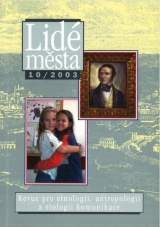Sociální recepce náboženských prvků v české folkové hudbě v 60. - 80. letech
DOI:
https://doi.org/10.14712/12128112.4279Abstrakt
Scant attention has been paid to the "golden age" of Czech folk music, which means the period from its beginnings in the 1960s till the end of the "normalisation" era. However, it was folk music which strongly contributed to the creation of value and ideological patterns in the epoch. lt became an object of criticism by the existing political and power establishment. Folk singers were seen as a sort of ethical prophets who provided consolation of de facto religious nature. As a result, they provoked, especially in the era of the Prague Spring and in the second half of the 1980s, a relatively strong social and political pressure. In fact, functional understanding of Czech folk songs from the time of the late "real socialism" as a type of religious phenomenon allows a thorough application of the sociological concept of (post)-modern "culture of the young". Thanks to its impact, there was an identification of the recipients with new values and eventually, due to this identification, also the constitution of distinctive social groups. Moreover, folk music sometimes "attacked" the existing groups and there was two-sided sharing of values. This mostly involved the subculture of Czech hippies from the late 1960s. However, at the beginning of the normalisation era it disappeared as fast as it emerged during the Prague Spring. Of longer duration were some recipient circles of folk music, mostly associated with a single artist or a specific type of music. In the first half of the 1970s this was particularly true of Jaroslav Hutka, while in the 1980s the development was more general. But here, too, one cannot speak of any long duration. A much more durable reaction to folk music could be ascertained in some clearly delineated social groups; they may have defined themselves as "underground" or having been established on the church basis (the Protestant youth) or to some extent also on the basis of idealised Catholicism. These groups, standing on the verge of social norm and legality, fully identified with the value scale of folk music. Typically, this is exemplified by ethical, eschatological, and sometimes mystical sharp emphasis on biblical traditions, which occurred in the religious folk as well as underground. ln a much smaller measure, this eventually repeated in the last years before the Velvet Revolution and shortly after it within a part of social majority, again mainly in the case of the youth. Although the reception of ready-made contents mediated through Czech folk music differed and changed in society and time, its cultural, social and political importance has shown that in (post)-modern society it is just the "aesthetic" sphere which extends into further institutional spheres, operating as a value and ideological source of social behaviour This is why folk music has become at least for a time one of the modern functional replacements of traditional religious feelings. As a result, Czech society was far from "lagging behind" Western societies as it is generally assumed. The onset of folk music in the 1960s, although it occurred in a much different social environment, which influenced its further activities as welI as development, was a prelude of a continual emergence of the popular "culture of the young". This transformation of social and cultural context of artistic creation, and its reception led to a functional replacement of religious feelings in a gradually widening section of society. This could be seen in the last quarter of the 20th century both in socialist Czechoslovakia and the West, although the post-modern transformation has not yet been fully compleled. Now only one thing can be said: it has obviously been confirmed that secularisation models of sociology of religion do not work. lt is increasingly obvious that the Western concept of religion, seriously affected by European ethno-centrism, is somewhat insufficient. It is already apparent that religious folk is th only permanently functional and at present absolutely most vigorous part of Czech folk music.
Stahování
Publikováno
Jak citovat
Číslo
Sekce
Licence

Tato práce je licencována pod Mezinárodní licencí Creative Commons Attribution-NonCommercial-NoDerivatives 4.0.


